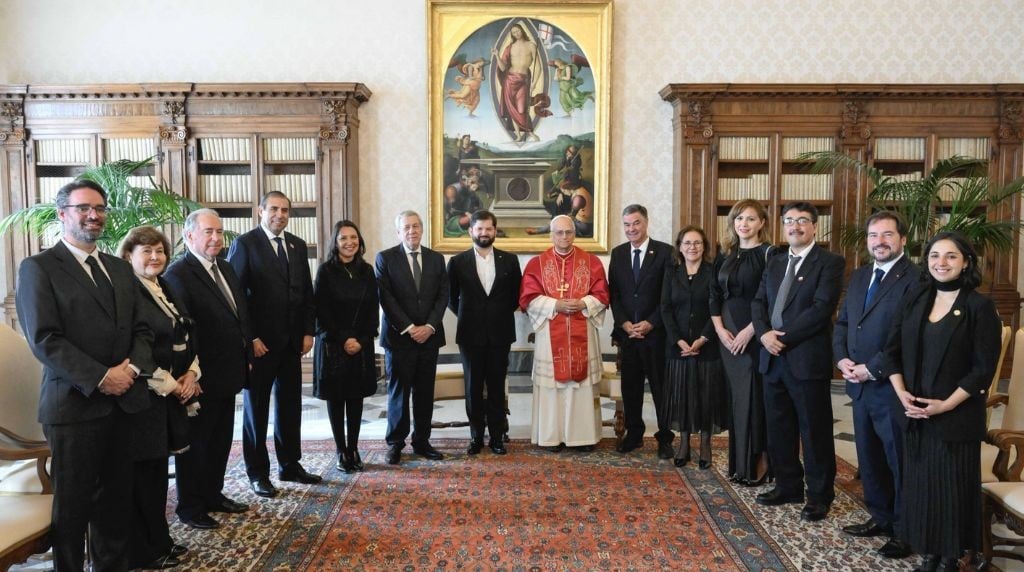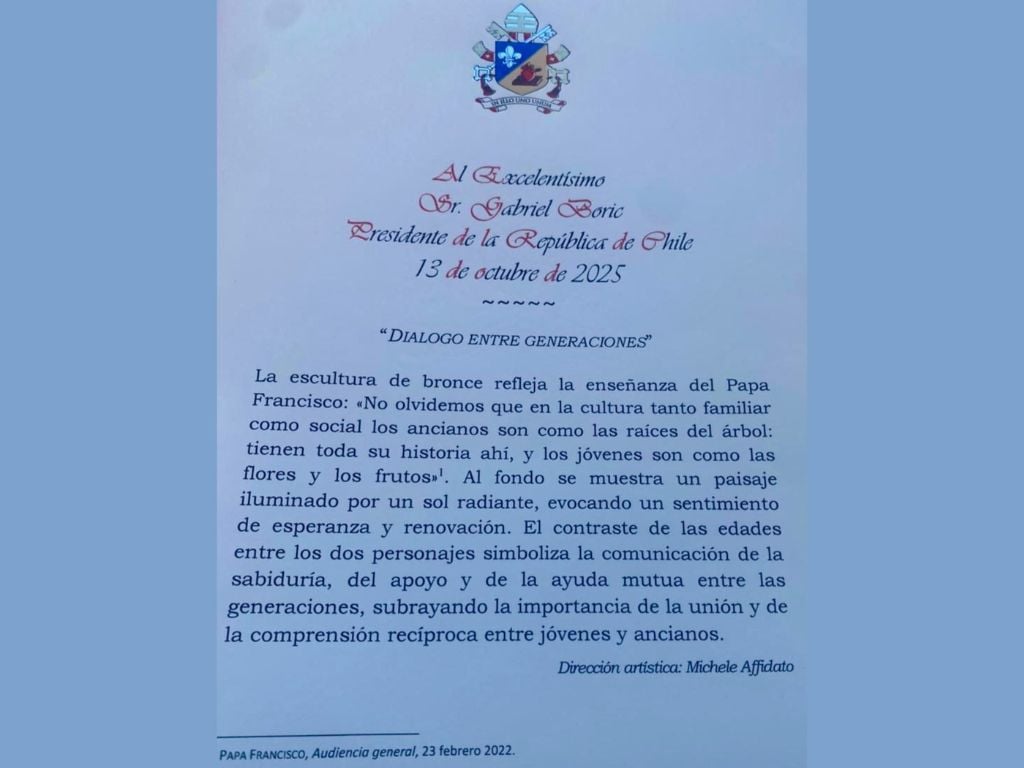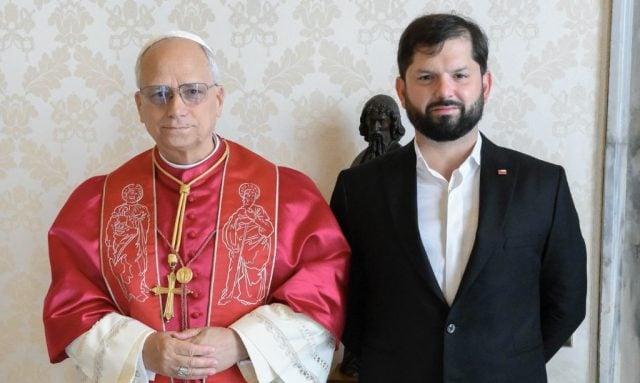Chile’s President Gabriel Boric held a private audience Monday with Pope Leo XIV at the Vatican, a meeting that ran longer than scheduled and focused on peace, democracy, social justice, and the Catholic Church’s abuse scandals in Chile.
The audience, held in the Library of the Apostolic Palace in Vatican City, began at 10:40 and ended at 11:25 local time — 45 minutes in total, notably longer than the 25 to 30 minutes initially planned.
After the private conversation concluded, the Chilean delegation entered the Library: Foreign Minister Alberto van Klaveren; Minister Secretary General of the Presidency, Macarena Lobos; Chile’s ambassador to the Holy See, Patricia Araya; Chile’s ambassador to the United States, Juan Gabriel Valdés; Senate President Manuel José Ossandón; Senator Loreto Carvajal; and Senators Sergio Gahona and Juan Ignacio Latorre.
Later, the president, joined by the foreign minister, Minister Lobos, and the ambassador to the Holy See, Patricia Araya, met with the Vatican Secretary of State, Pietro Parolin.
‘Dilexi te’ and serving the most disadvantaged
Speaking to reporters, President Boric described his meeting with Pope Leo XIV as warm and reflective.
‘We mainly discussed the exhortation he wrote building on Pope Francis’s reflections,’ the president said, ‘and I encourage everyone in Chile to read it.’
‘It’s called Dilexi te, an apostolic exhortation that speaks to the Church but also to politicians,’ he explained.
He noted that he does not have ‘the gift of faith,’ yet he feels called by the exhortation’s message: to serve the most dispossessed, the most vulnerable, the poorest, not only in material terms but across every dimension.
‘Those of us in politics must address, here on Earth, the structural causes of poverty, loneliness, and exclusion,’ he added, urging humility, respect for those who think differently, and an austere, service-first approach to public office. ‘I studied the exhortation before coming, and its words are powerful and compelling.’
He emphasized its insistence that no one is entitled to keep for exclusive use what exceeds their own needs when others lack what is essential.
According to Boric, Leo XIV urges continued denunciation of ‘an economy that kills’ and warns that as the profits of a few soar, the majority drifts ever farther from the well-being enjoyed by a privileged minority. He links this imbalance to ideologies of absolute market autonomy and financial speculation, and calls on society to reclaim its dignity rather than legitimize a distributive model that a finite planet cannot sustain.
For Boric, it is a clear, forceful appeal to build a society with more equality, dignity, and respect — a message he says he shares and that reflects his government’s goals.
He stressed that the Pope’s exhortation is not ideological and urges politicians to rise above permanent discredit, insults, and division to focus on what they were elected to do: improve people’s lives.
Pain caused by the Catholic Church in Chile
He added that in their private audience they also discussed sensitive issues specific to Chile, including the pain caused by sexual abuse in the Catholic Church — something that affected Leo XIV as a missionary and deeply wounded the late Pope Francis as well.
‘He explicitly mentioned the cases of Fernando Karadima and Juan Barros, and how deeply they affected Pope Francis, particularly during his visit to Chile,’ Boric said, recounting Leo XIV’s remarks.
Cease-fire in Gaza
Asked about Monday’s cease-fire signing ceremony for Gaza in Egypt, the president said the first phase of the agreement is underway there, with the release of hostages and Palestinian prisoners expected to begin today alongside a cease-fire.
‘We are encouraged that this massacre may finally end,’ he said, expressing hope that peoples who have suffered for generations can live in peace and exercise self-determination.
He said the Pope shared his hope for the process and for all leaders to act with humility and respect for those who are suffering and those who have suffered.
Boric also noted that this year marks 40 years since Chile and Argentina signed a treaty that, thanks to papal mediation, averted the war of 1978.
‘As a country we were on the brink of war with Argentina. We often talk — rightly — about the pain of conflicts that occurred, but rarely about those that were avoided,’ he said. ‘Imagine if there had been a war in 1978: how much pain and rupture we would still carry. The Church’s mediation then was fundamental to bridge differences and bring sister nations back together.’
Regarding the role of U.S. President Donald Trump in talks between Hamas and Israel to reach a Gaza cease-fire, the head of state said anyone who advances peace is welcome.
‘I don’t know the details of the negotiations. I believe leaders must be humble and respectful of their adversaries, and I do not think President Trump embodies that. But if he contributed to stopping the massacre in Gaza, that contribution is welcome. This is no time for small-mindedness; what matters is ending people’s suffering,’ he argued.

‘I invited him to Chile’
After recalling Pope John Paul II’s visit and how important that 1987 moment of unity was for Chile, President Boric said he extended an invitation for Leo XIV to visit the country.
‘I invited him. I can’t guarantee anything, but on behalf of the State of Chile I told him he is welcome,’ he said.
Abortion and euthanasia
Although Boric said they did not ‘specifically discuss’ the government’s abortion and euthanasia proposals with the Pope, he confirmed the topics were later addressed with the Secretary of State.
‘We may have differences — they are legitimate, and we respect the Church’s view,’ he noted, referencing a conversation with Cardinal Chomali. ‘Our government is advancing a euthanasia law to allow those who freely and responsibly choose it to have a dignified death, and we are also pursuing the right to abortion without specific grounds. The Church holds another opinion and that is welcome; what we agree on is that none of these policies can, under any circumstances, mean abandoning the most vulnerable.’
Why he did not meet with Meloni
At the press point, the president explained he would not meet with Italy’s Prime Minister Giorgia Meloni because she is attending the Peace Conference in Egypt.
‘She is in Egypt at the moment,’ he explained. ‘We formally requested a meeting through the Foreign Ministry. This trip was scheduled in advance, and the events in Egypt arose after it was planned, so it was simply a schedule clash.’
‘As head of state, I have a duty — and I always do so when abroad — to meet with the heads of government and state of the countries I visit. I will do so with President Sergio Mattarella here, and I would have met with Prime Minister Giorgia Meloni had she been in Italy. In that sense, I never lose sight that I represent a state,’ he stressed.

Exchange of gifts
After the official photo, gifts were exchanged. The president presented the Pope with a vinyl record of ‘La Cantata por los Derechos Humanos’; a book on the Vicaría de la Solidaridad titled ‘Vicaría de la Solidaridad: Una experiencia sin fronteras’ by Gilberto C. Aranda; Pablo Neruda’s illustrated book ‘Alturas de Macchu Picchu’; a selection of Chilean wines; and the jersey of Chile’s national rugby team, Los Cóndores, which recently qualified for the World Cup.
For its part, the Holy See gave the president a bronze sculpture titled ‘Dialogue Between Generations,’ reflecting the teaching of the late Pope Francis: ‘Let us not forget that in culture, whether in the family or in society, the elderly are like the roots of a tree: they hold the whole history there, and the young are like the flowers and the fruit’; the ‘Message for Peace,’ written by Pope Francis and published in January of this year; and a photo book of artworks from the Apostolic Palace.
The Holy Father also presented every member of the delegation with a keepsake: the Pontifical Medal.

